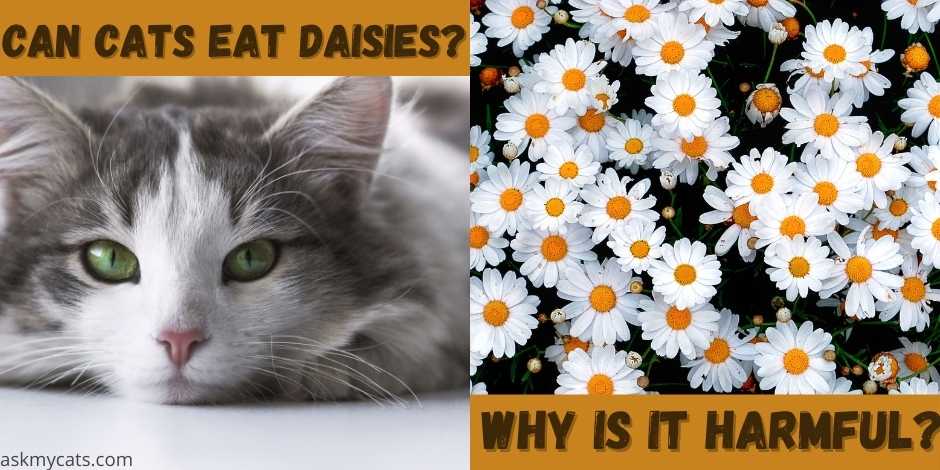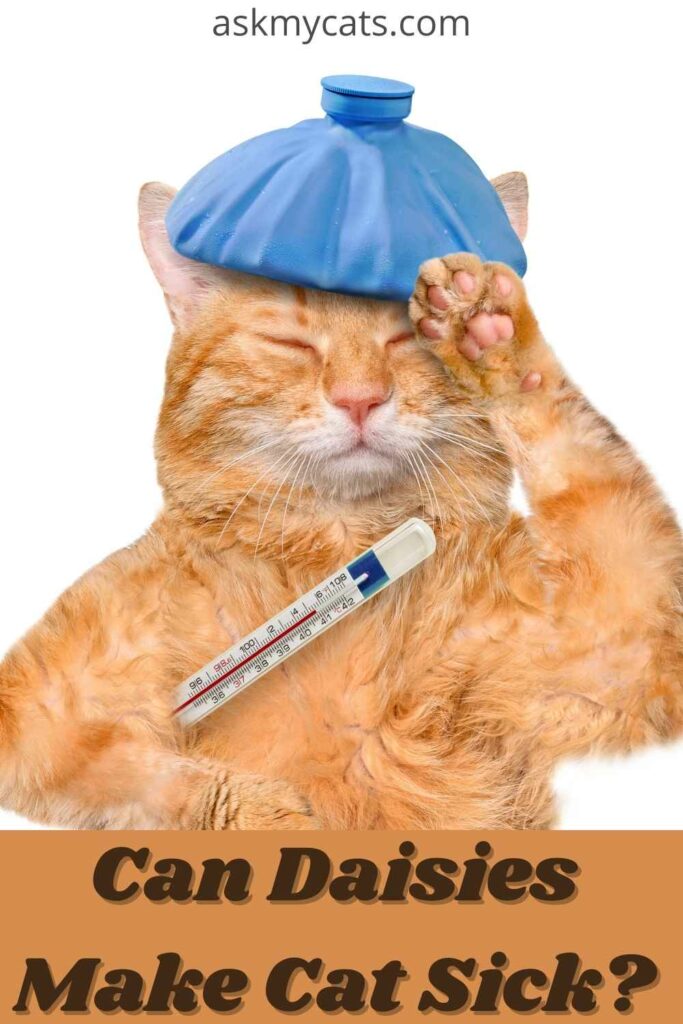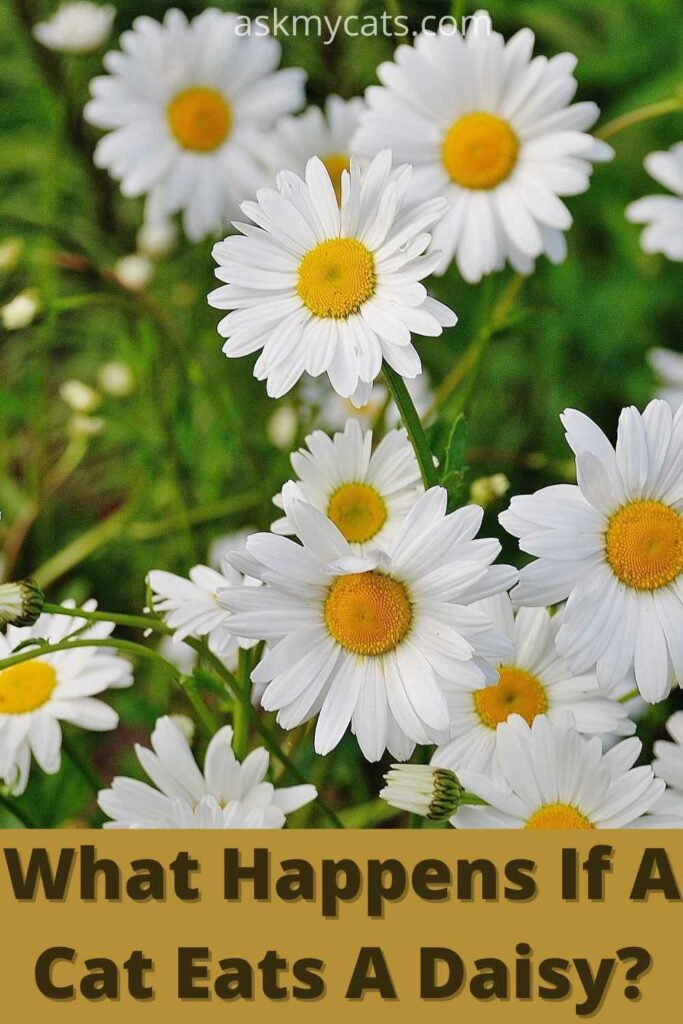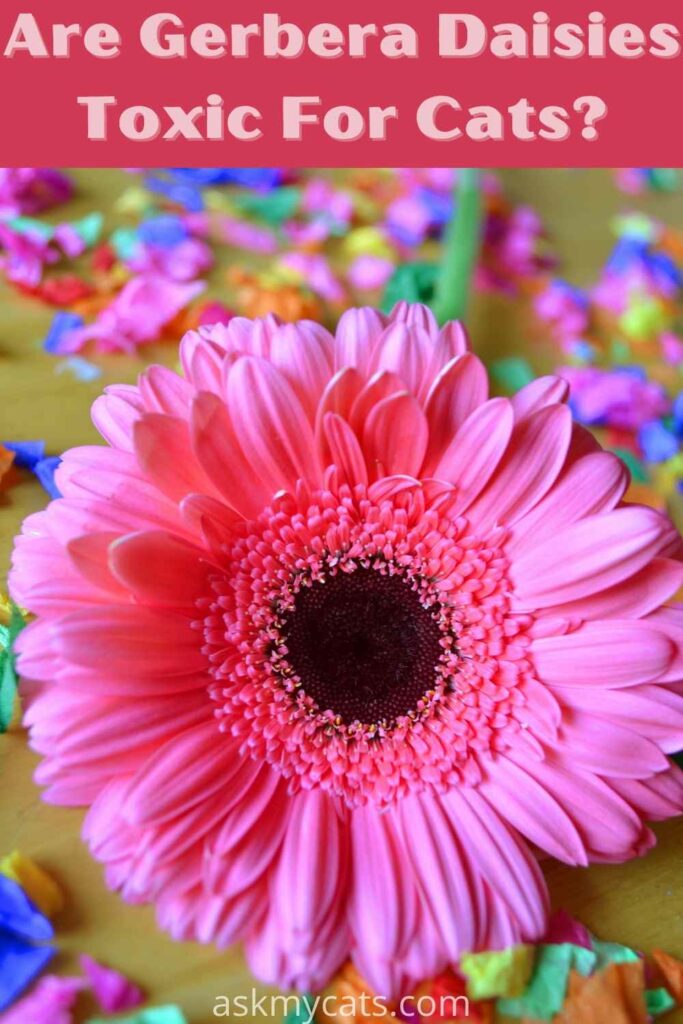Daisies! The kind of plants that mesmerizes us every time and makes us fall in love with the color and scent they generate, but here comes the main protagonist of every paw-rents life, the beautiful felines that always subject us with apprehensions and this stays relevant in the case of daisies too.
Usually, we often come across plants and our natural instinct is to take them home, however, our felines who are inquisitive and like to analyze everything that steps in the house is a fact that shakes our willpower.
Don’t you worry, today I have got a whole article on the topic which I hope will halt all the contemplations you have gathered about daisies.
But before stepping in, let me answer the first question that must have popped in your head, can cats eat daisies? No, cats shouldn’t eat daisies as they may aggravate their allergies and also end up giving their severe irritations as it contains a potent irritant sesquiterpene.
Stay stick to your screens, we are taking this further now.


Give Your Cat the Perfect Day
Get the Free Ebook!
Can Daisies Make Cat Sick?
Daisies can make your cat sick as it has several chemicals such as sesquiterpene and pyrethrins that a cat cannot tolerate because it doesn’t have the needed mechanism to cope up with such harmful and toxic chemicals or irritant.

Sesquiterpene is a potent irritant that can be irritating and increasing the production of saliva that often end up giving feline vomiting and diarrhea.
It’s also found that it can be bleeding within the digestive tract which can also make your cat lose appetite which will ensure no intake of essential nutrients making them severely ill.
Another imperative reason why daisies are not recommended for your felines is the presence of pyrethrins which have an adverse effect on a cat’s nervous system.
They also have a vast possibility to be absorbed in felines bloodstream ending up in seizures, disassociation, hypersalivation, and hyperexcitability.
Both of these chemicals can be extremely hazardous if your feline’s health is in a deteriorating state. Symptoms can be heavy breathing, respiratory damage.
In simpler words, you should keep daisies away from your furry babies’ reach.
What Happens If A Cat Eats A Daisy?
There are a couple of symptoms that a feline will drop if it has ingested daisy. Most of the signs are usually very transparent and you can quickly ascertain there is something wrong by seeing the behavior your cat Is likely to possess.
Some of such behaviors or symptoms include vomiting, diarrhea, dermatitis, etc.
Here are the symptoms being mentioned in a more brief manner to help you detect unfavorable occurrences from the roots.

1. Vomiting
After a few hours of ingesting a daisy, a feline will very likely try to purge out all the eaten toxins out of the digestive tract by vomiting.
While vomiting itself is not a severe symptom and it’s usually a behavior cats carry out even on normal days when they seem to have eaten something toxic.
However, in such cases, make sure you hydrate the feline as dehydration will give space to the complications stemming from eating or ingesting a daisy which usually is severe considering the contents it comprises of.
2. Dermatitis
The chemicals present in daisies can aggravate the allergies and can make a cat itch severely to alleviate the irritation caused. There are high chances of a rash spot from where your cat has come in contact with the plant.
Keep the situation in check and try to keep the veterinarian in the loop if the situation doesn’t seem to perish soon.
3. Hemorrhaging
This is usually the indicator of a serious condition. In severe cases of daisy, poisoning cats are likely to bleed internally and the streaks of blood can be noticed in the cat’s feces and vomit of the cat.
It should also be kept in mind that intestinal bleeding can cause the feces to appear black. This is an alarming occurrence and should be detected initially to not let it formulate fatal situations.
4. Disassociation
A cat is very likely to disassociate from the surrounding once they ingest a daisy and contract the poison which makes it difficult for them to carry out their daily activities which are usually accompanied by excessive drooling and salivation. The feline will be reluctant to eat and feel lethargic most of the time.
This can be an ultimatum for the owners to get their act together and take them to the vet for necessary precautions to be taken.
Are Gerbera Daisies Toxic For Cats?
Gerbera daisies are non-toxic for cats and you don’t need to worry if you find your cat around them.

While it’s just been mentioned that gerbera daisies are non-toxic for a feline but there is still a slight possibility of them giving your feline unease and stomach ache after ingestion.
Cats are obligate carnivores and they cannot switch their diet to being herbivore by which I mean they cannot break down a plant-based diet.
In such cases, a feline is likely to feel unsettling, vomit and diarrhea can also accompany in some cases. It’s common for such symptoms to fade away in about 24 hours or so, but if it doesn’t, get your veterinarian all ready for a quick visit.
Furthermore, it should also be mentioned that gerbera daisies might not cause any harm to a feline but the fertilizers, pesticides, and herbicides can turn out to be toxic for your little kitty.
Once a fertilizer is used on the plant, the residue stays on the leaves which if ingested by cats can end up in illness which might need an urgent vet consultation.
Are Yellow Daisies Poisonous For Cats?
Yellow daisies can be poisonous for cats as it has the presence of pyrethrins, a type of chemical that shouldn’t be ingested by felines in any case.
Daisies whether yellow or white have the dominating presence of pyrethrins and sesquiterpene that shouldn’t be in any way given to felines as they are very high in toxins and can malign the whole health of a feline.
These chemicals are found in many plants just like daisy and if eaten can give severe allergies which if goes not detected in the initial stages can turn out to be fatal.
You should keep your feline away from yellow daisies as if it’s probable they will end up ingesting it in a great amount which can cause internal bleeding and block the digestive tract which can also result in unresponsive vital organs.
Is African Daisy Toxic to cats?
African daisies are not toxic for your cats and can be your cat’s additional diet they are allowed to have in the backyard.
Although, the intake of such plants should be kept in check as there is always a slight for them to give stomach aches unfolding into diarrhea and vomiting to your feline as their bodies deprive the mechanism that can break down complex plant-based diets.
Also, the chemicals that you might had used in the plants can give your cat toxicity in some way or the better which makes us come to the conclusion that the little furry babies should be kept away from such plants as long as possible.
Flowers Which Are Toxic For Cats
There are many flowers found in our neighborhood and even in our backyard which are extremely toxic for our cats and in worst of the worst cases turn out to be fatal. I am mentioning some of such flowers below which you should get rid of if your feline is an outdoorsy pet and likes to be in the backyard most of the time.
- True lilies and daylilies
- Azalea
- Tulips
- Lily of the valley
- Daffodils
- Oleander
These are the plants that you should keep away from you felines as it can be toxic and end up various complications which have the possibility of being severe at some cases.
Frequently Asked Questions
What flowers are dangerous and fatal for cats?
Carnations, tulips, and chrysanthemums are toxic for a cat as they are sensitive and easily prone to infection if these flowers are ingested in huge amounts.
What are Shasta daisies? Are they poisonous for cats?
Shasta daisies are a type of chrysanthemum and they are toxic for cats as mentioned in the ASPC list of top toxic flowers for cats.
What are the extreme effects of daisy poisoning in cats?
Restlessness, excessive saliva production, racing heart, drooling, and seizures are some of the extreme effects of daisy poisoning in felines.
Final Words
All along with this article, we have come across various types of daisies and how they hold the vast chances of being toxic for our cats tenaciously.
We have finally come to the conclusion that daisies are toxic for cats and we should refrain away from making them accessible to our cats, while gerbera daisies are non-toxics they still have a slight possibility of being harmful because of the chemicals such as fertilizers being used on it. It can disrupt a feline’s digestive system.
To let my words have a peaceful end, let me drop a question for you all to ponder some deep thoughts on.
Okay, so what was the first time you realized daisies are toxic to cats? Was it after reading this article or you were known to it before?
Think about what you knew and drop it in the comments box, I am eager to hear back from each one of you.

Can cats eat the leaves of a daisy plant? I know the daisy is poisonous, but what about the leaves?
It is harmful to cats to eat daisy leaves as well. It contains certain chemicals which are known to irritate them if consumed in high quantities.